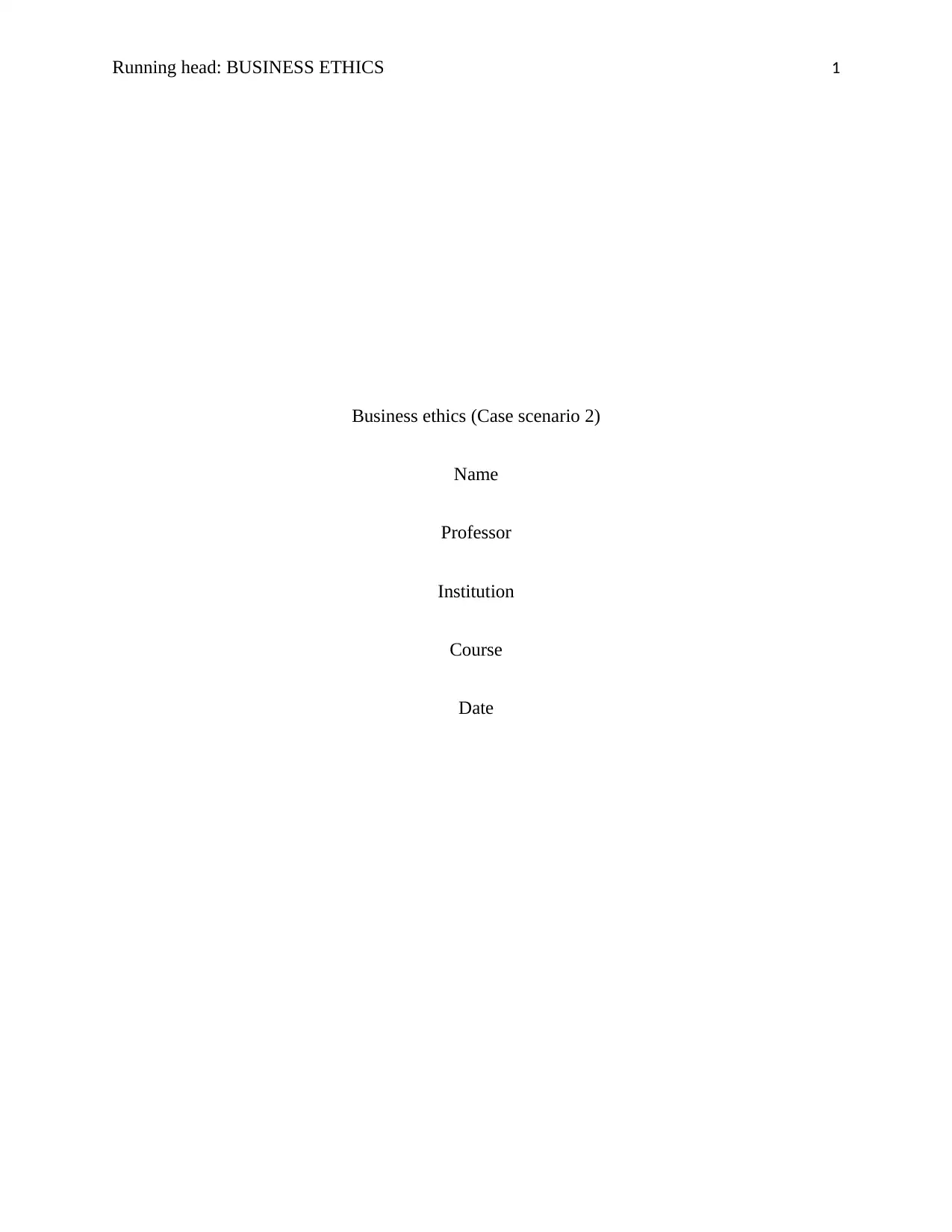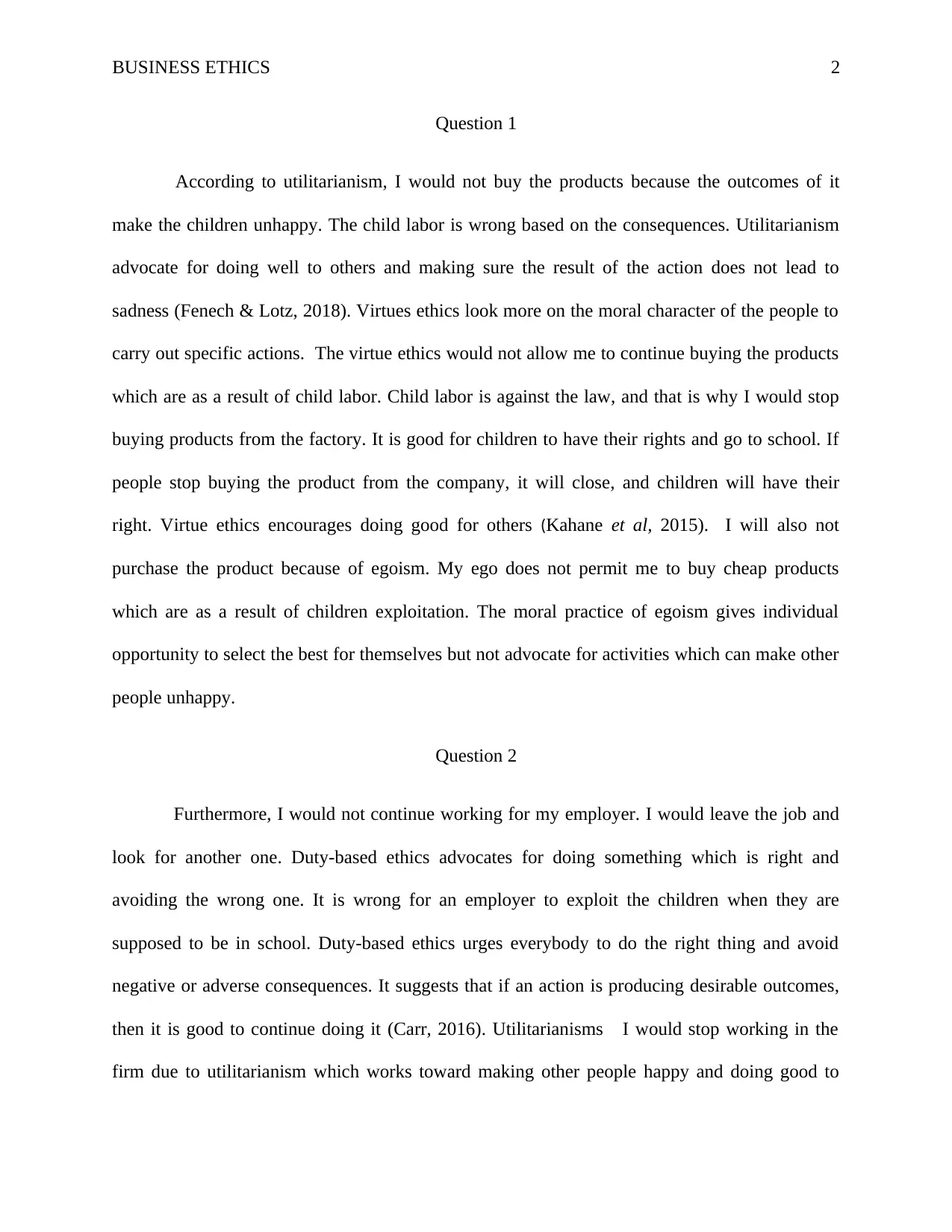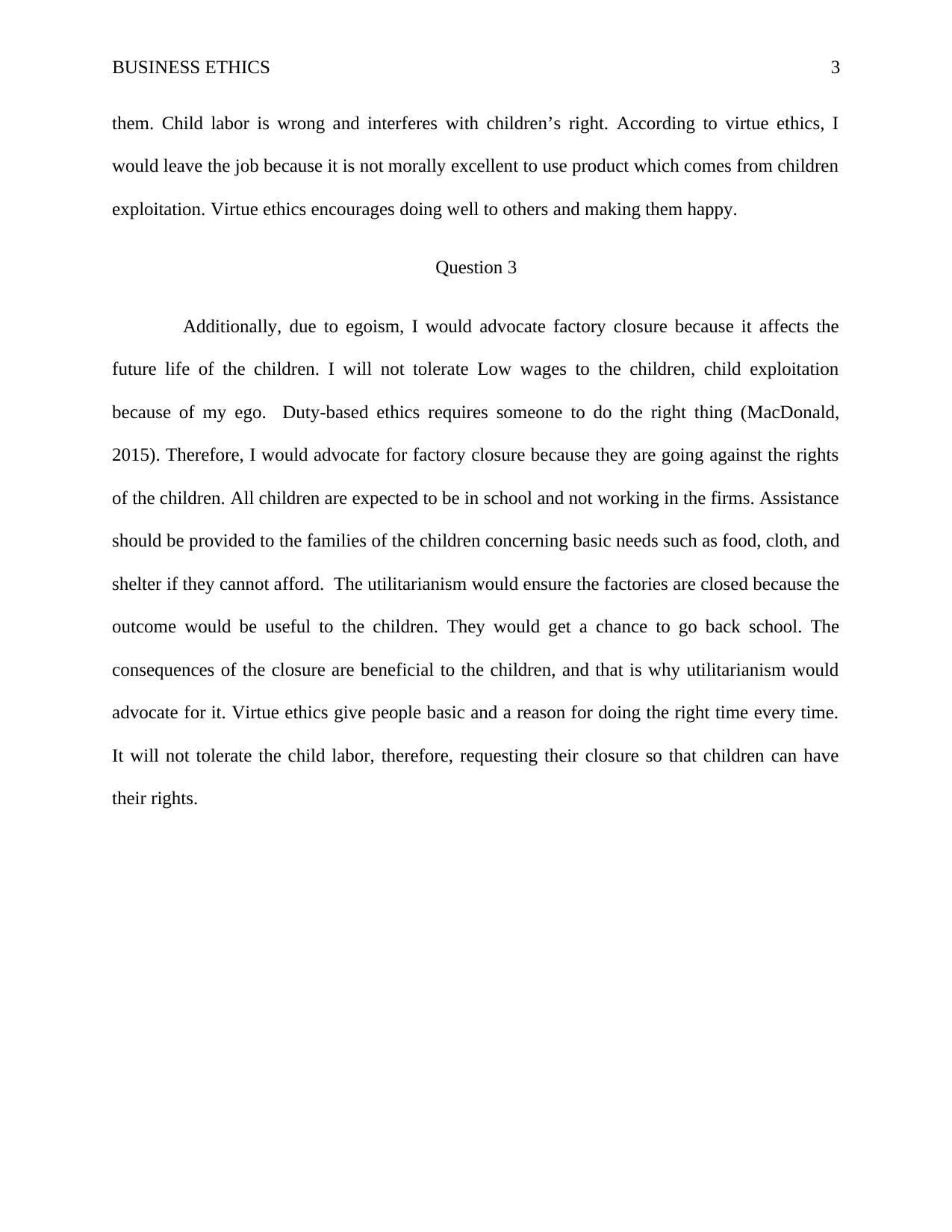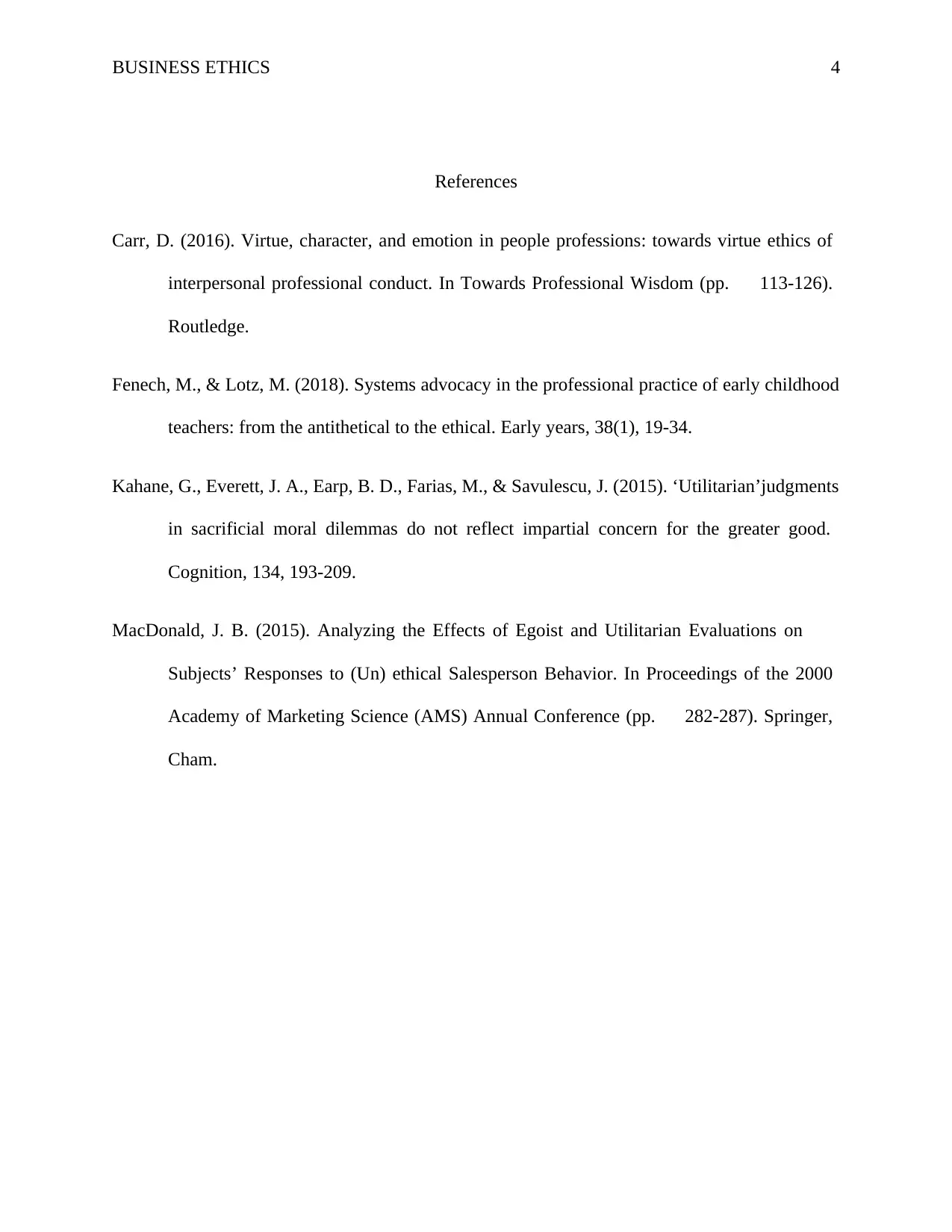Business Ethics: Child Labor Case Study and Application of Ethics
VerifiedAdded on 2023/06/07
|4
|809
|68
Case Study
AI Summary
This case study examines the ethical implications of child labor using utilitarianism, virtue ethics, egoism, and duty-based ethics. The author analyzes whether to buy products made by child labor, continue working for an employer who exploits children, and advocate for factory closure. The analysis concludes that, based on these ethical frameworks, one should not support child labor, should leave an employer who exploits children, and should advocate for the closure of factories that employ children. The paper references academic articles to support its arguments and provides a comprehensive ethical evaluation of the scenario. Desklib offers similar solved assignments and past papers to aid students in their studies.

Running head: BUSINESS ETHICS 1
Business ethics (Case scenario 2)
Name
Professor
Institution
Course
Date
Business ethics (Case scenario 2)
Name
Professor
Institution
Course
Date
Paraphrase This Document
Need a fresh take? Get an instant paraphrase of this document with our AI Paraphraser

BUSINESS ETHICS 2
Question 1
According to utilitarianism, I would not buy the products because the outcomes of it
make the children unhappy. The child labor is wrong based on the consequences. Utilitarianism
advocate for doing well to others and making sure the result of the action does not lead to
sadness (Fenech & Lotz, 2018). Virtues ethics look more on the moral character of the people to
carry out specific actions. The virtue ethics would not allow me to continue buying the products
which are as a result of child labor. Child labor is against the law, and that is why I would stop
buying products from the factory. It is good for children to have their rights and go to school. If
people stop buying the product from the company, it will close, and children will have their
right. Virtue ethics encourages doing good for others (Kahane et al, 2015). I will also not
purchase the product because of egoism. My ego does not permit me to buy cheap products
which are as a result of children exploitation. The moral practice of egoism gives individual
opportunity to select the best for themselves but not advocate for activities which can make other
people unhappy.
Question 2
Furthermore, I would not continue working for my employer. I would leave the job and
look for another one. Duty-based ethics advocates for doing something which is right and
avoiding the wrong one. It is wrong for an employer to exploit the children when they are
supposed to be in school. Duty-based ethics urges everybody to do the right thing and avoid
negative or adverse consequences. It suggests that if an action is producing desirable outcomes,
then it is good to continue doing it (Carr, 2016). Utilitarianisms I would stop working in the
firm due to utilitarianism which works toward making other people happy and doing good to
Question 1
According to utilitarianism, I would not buy the products because the outcomes of it
make the children unhappy. The child labor is wrong based on the consequences. Utilitarianism
advocate for doing well to others and making sure the result of the action does not lead to
sadness (Fenech & Lotz, 2018). Virtues ethics look more on the moral character of the people to
carry out specific actions. The virtue ethics would not allow me to continue buying the products
which are as a result of child labor. Child labor is against the law, and that is why I would stop
buying products from the factory. It is good for children to have their rights and go to school. If
people stop buying the product from the company, it will close, and children will have their
right. Virtue ethics encourages doing good for others (Kahane et al, 2015). I will also not
purchase the product because of egoism. My ego does not permit me to buy cheap products
which are as a result of children exploitation. The moral practice of egoism gives individual
opportunity to select the best for themselves but not advocate for activities which can make other
people unhappy.
Question 2
Furthermore, I would not continue working for my employer. I would leave the job and
look for another one. Duty-based ethics advocates for doing something which is right and
avoiding the wrong one. It is wrong for an employer to exploit the children when they are
supposed to be in school. Duty-based ethics urges everybody to do the right thing and avoid
negative or adverse consequences. It suggests that if an action is producing desirable outcomes,
then it is good to continue doing it (Carr, 2016). Utilitarianisms I would stop working in the
firm due to utilitarianism which works toward making other people happy and doing good to

BUSINESS ETHICS 3
them. Child labor is wrong and interferes with children’s right. According to virtue ethics, I
would leave the job because it is not morally excellent to use product which comes from children
exploitation. Virtue ethics encourages doing well to others and making them happy.
Question 3
Additionally, due to egoism, I would advocate factory closure because it affects the
future life of the children. I will not tolerate Low wages to the children, child exploitation
because of my ego. Duty-based ethics requires someone to do the right thing (MacDonald,
2015). Therefore, I would advocate for factory closure because they are going against the rights
of the children. All children are expected to be in school and not working in the firms. Assistance
should be provided to the families of the children concerning basic needs such as food, cloth, and
shelter if they cannot afford. The utilitarianism would ensure the factories are closed because the
outcome would be useful to the children. They would get a chance to go back school. The
consequences of the closure are beneficial to the children, and that is why utilitarianism would
advocate for it. Virtue ethics give people basic and a reason for doing the right time every time.
It will not tolerate the child labor, therefore, requesting their closure so that children can have
their rights.
them. Child labor is wrong and interferes with children’s right. According to virtue ethics, I
would leave the job because it is not morally excellent to use product which comes from children
exploitation. Virtue ethics encourages doing well to others and making them happy.
Question 3
Additionally, due to egoism, I would advocate factory closure because it affects the
future life of the children. I will not tolerate Low wages to the children, child exploitation
because of my ego. Duty-based ethics requires someone to do the right thing (MacDonald,
2015). Therefore, I would advocate for factory closure because they are going against the rights
of the children. All children are expected to be in school and not working in the firms. Assistance
should be provided to the families of the children concerning basic needs such as food, cloth, and
shelter if they cannot afford. The utilitarianism would ensure the factories are closed because the
outcome would be useful to the children. They would get a chance to go back school. The
consequences of the closure are beneficial to the children, and that is why utilitarianism would
advocate for it. Virtue ethics give people basic and a reason for doing the right time every time.
It will not tolerate the child labor, therefore, requesting their closure so that children can have
their rights.
⊘ This is a preview!⊘
Do you want full access?
Subscribe today to unlock all pages.

Trusted by 1+ million students worldwide

BUSINESS ETHICS 4
References
Carr, D. (2016). Virtue, character, and emotion in people professions: towards virtue ethics of
interpersonal professional conduct. In Towards Professional Wisdom (pp. 113-126).
Routledge.
Fenech, M., & Lotz, M. (2018). Systems advocacy in the professional practice of early childhood
teachers: from the antithetical to the ethical. Early years, 38(1), 19-34.
Kahane, G., Everett, J. A., Earp, B. D., Farias, M., & Savulescu, J. (2015). ‘Utilitarian’judgments
in sacrificial moral dilemmas do not reflect impartial concern for the greater good.
Cognition, 134, 193-209.
MacDonald, J. B. (2015). Analyzing the Effects of Egoist and Utilitarian Evaluations on
Subjects’ Responses to (Un) ethical Salesperson Behavior. In Proceedings of the 2000
Academy of Marketing Science (AMS) Annual Conference (pp. 282-287). Springer,
Cham.
References
Carr, D. (2016). Virtue, character, and emotion in people professions: towards virtue ethics of
interpersonal professional conduct. In Towards Professional Wisdom (pp. 113-126).
Routledge.
Fenech, M., & Lotz, M. (2018). Systems advocacy in the professional practice of early childhood
teachers: from the antithetical to the ethical. Early years, 38(1), 19-34.
Kahane, G., Everett, J. A., Earp, B. D., Farias, M., & Savulescu, J. (2015). ‘Utilitarian’judgments
in sacrificial moral dilemmas do not reflect impartial concern for the greater good.
Cognition, 134, 193-209.
MacDonald, J. B. (2015). Analyzing the Effects of Egoist and Utilitarian Evaluations on
Subjects’ Responses to (Un) ethical Salesperson Behavior. In Proceedings of the 2000
Academy of Marketing Science (AMS) Annual Conference (pp. 282-287). Springer,
Cham.
1 out of 4
Related Documents
Your All-in-One AI-Powered Toolkit for Academic Success.
+13062052269
info@desklib.com
Available 24*7 on WhatsApp / Email
![[object Object]](/_next/static/media/star-bottom.7253800d.svg)
Unlock your academic potential
Copyright © 2020–2025 A2Z Services. All Rights Reserved. Developed and managed by ZUCOL.




